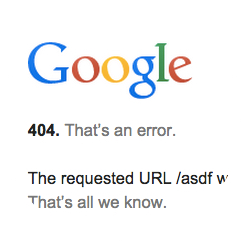3 Shut-Downs: International Pressure Mounts Against Google
Google has been making all kinds of international headlines lately, and not for big wins. The search giant has been facing regulatory pressure from the EU for years, and there’s no end in sight. Authorities overseas have predicted at least a decade of continued antitrust litigation against the company. In nations with overtly restrictive governments, Google never even got a hearing. In 2010, the company vaguely cited being blocked, at least in part, in 25 of the 100 countries where Google services were available. The 2014 Transparency Report detailed seven nations where services are intentionally disrupted, and promised that the list was not comprehensive. In recent years three big international plays have highlighted the pressure that Google is under from overseas regimes, and called into question the company’s plans for global domination.
Search Censorship and Email Phishing in China
 In 2010, Google officially closed Google.cn and started redirecting users to their Hong Kong homepage, although it’s likely that China blocks Google.com.hk within its borders. For years, Google complied with Beijing’s request for censorship, but after a series of cyberattacks compromised the Gmail accounts of private citizens, the company had had enough. The official Google blog from March 22, 2010, explains,
In 2010, Google officially closed Google.cn and started redirecting users to their Hong Kong homepage, although it’s likely that China blocks Google.com.hk within its borders. For years, Google complied with Beijing’s request for censorship, but after a series of cyberattacks compromised the Gmail accounts of private citizens, the company had had enough. The official Google blog from March 22, 2010, explains,
… during our investigation into these attacks we had uncovered evidence to suggest that the Gmail accounts of dozens of human rights activists connected with China were being routinely accessed by third parties, most likely via phishing scams or malware placed on their computers. We also made clear that these attacks and the surveillance they uncovered—combined with attempts over the last year to further limit free speech on the web in China including the persistent blocking of websites such as Facebook, Twitter, YouTube, Google Docs and Blogger—had led us to conclude that we could no longer continue censoring our results on Google.cn.
During a shareholders’ meeting in 2013, Google reaffirmed that that Chinese government would have to make some dramatic changes before the company invests any further in their market.
Google News Spain Shuts Down
 More recently, Google pulled their News services from the market in Spain. A new Spanish law, effective at the start of 2015, requires that Spanish news publishers charge Google News for displaying snippets of their work in search results. In response, Google immediately shut down Spanish News services, saying,
More recently, Google pulled their News services from the market in Spain. A new Spanish law, effective at the start of 2015, requires that Spanish news publishers charge Google News for displaying snippets of their work in search results. In response, Google immediately shut down Spanish News services, saying,
As Google News itself makes no money (we do not show any advertising on the site) this new approach is simply not sustainable.
Google’s decision may have been motivated equally by principal as by cost, because the motivation behind the Spanish Government’s decision is similarly questionable. What is actually going to happen to Google News Spain is a complicated discussion, and one that only time will resolve.
Shuttering Moscow Offices
 Russian Parliament also passed a law — this one is to take effect in 2016 — that requires all foreign tech companies to keep data on Russian citizens within the country’s borders. Google isn’t waiting around a year, and started closing their Russian offices on January 1. They reportedly employ about 50 engineers in Russia, who have been offered positions at Google in other countries. Moscow insists that the purpose of the law is to protect its citizens from international cybercrime, but critics are leaning more toward motivations that feature the government’s ability to keep a tight grip on information.
Russian Parliament also passed a law — this one is to take effect in 2016 — that requires all foreign tech companies to keep data on Russian citizens within the country’s borders. Google isn’t waiting around a year, and started closing their Russian offices on January 1. They reportedly employ about 50 engineers in Russia, who have been offered positions at Google in other countries. Moscow insists that the purpose of the law is to protect its citizens from international cybercrime, but critics are leaning more toward motivations that feature the government’s ability to keep a tight grip on information.
Google at a Tipping Point
Google’s mission has long been, “to organize the world’s information and make it universally accessible and useful.” Unfortunately, the governments that control some of the markets where Google offers their services have long been opposed to those ideas. Others may still be clinging to old systems, and passing regulations to try to make the internet fit into those systems. Whatever the motives, it remains to be seen if the search engine will come out on top, especially in the next decade. Pressure against Google continues to mount, and it’s unlikely to let up anytime soon. If Google can survive the fines, the litigation, and the censorship long enough, they might expand some horizons and find more freedom in the next generation of business and political leadership. If not, the giant might already be falling.
What's Next?
Profound Strategy is on a mission to help growth-minded marketers turn SEO back into a source of predictable, reliable, scalable business results.
Start winning in organic search and turn SEO into your most efficient marketing channel. Subscribe to updates and join the 6,000+ marketing executives and founders that are changing the way they do SEO:
And dig deeper with some of our best content, such as The CMO’s Guide to Modern SEO, Technical SEO: A Decision Maker’s Guide, and A Modern Framework for SEO Work that Matters.




